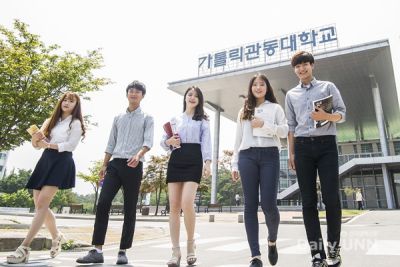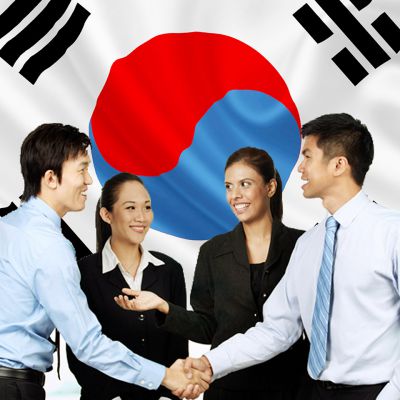KOREAN LEARNING HANDBOOK
You are intending to study in Korea, but don't know where to start, what to prepare and what life will be like after entry. With all the experience and practical experience that we have gone through, hopefully the following article will answer your questions and help you prepare mentally to come to this beautiful country.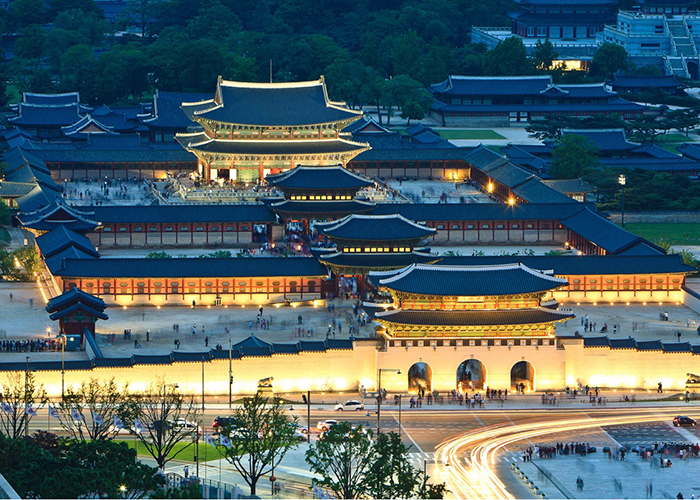
Gyeongbok Palace
Should you choose Korea to study abroad?
Korea is a country with a strong developed economy, among the top 4 major economies in Asia. In addition, Korea is also famous for tourism, culture, people, entertainment and especially the beauty industry. These are all reasons why young people choose Korea as their future destination.
(1) Quality education meets international standards, degrees are recognized globally
(2) There are many expansion policies for international students
✧ Allowed to work part-time while studying with attractive hourly salary
✧ Support to find a part-time job
✧ Many attractive scholarship programs with tuition fees from 20% - 100%
✧ There are also scholarships for housing, living,...
✧ Support to find a job after Graduation
✧ Long-term settlement opportunity
(3) Rich and diverse culture
I. WHAT SCHOOL SHOULD CHOOSE WHEN STUDY IN KOREA?
1. Family's financial capacity
If you want to study abroad on your own, it is imperative that you have enough money to study for 1 year without the pressure of expenses. Therefore, you and your family should prepare from 8,000 - 10,000 USD. Because during the first 6 months, according to Korean law, you cannot work part-time.
If your family's finances are limited, you should not enroll in the top TOP schools because often these schools have very high tuition fees. And the cost of living if you live in Seoul is also significantly higher than if you live in other cities.
2. My own learning
If you are a person with good academic ability, you should choose the top school because the top schools will have much higher admission standards than the schools below. Usually the top schools are really only for those who study well, want to challenge themselves and their families with conditions.
3. Specialized orientation
Not every school has all the majors you want to study, each school will have their own majors and strengths. If the school you are studying for a language course does not have a major that you are interested in, then after the end of the language year, you can change schools.
4. Have relatives in Korea
If you have a close relative or (distant) relative living in Korea (married to a Korean wife/husband, studying, living, etc.), it will be very convenient. Because if you live with your loved ones, you almost don't have to pay for housing costs - one of the most expensive expenses in the land of kimchi.
5. Number of Vietnamese students studying abroad
If you choose a school with many Vietnamese students studying, you will feel less lonely and these schools must have many advantages to attract so many international students. If you are a person who wants to challenge and want to be new, you should refrain from choosing schools that have too many Vietnamese students.
|
Criteria |
Advantage |
Defect |
|
TOP 1% university with priority in Korea |
– Minimize visa applications in Vietnam
– Can get a direct visa if you get a visa code
– The time to get the visa result will be faster depending on the school |
– The schools consider the application very carefully (due to the high competition rate) – Students who intend to flee will choose these schools (especially in the North area) – The rate of illegal students in the following years will be suddenly high (if the school does not manage well) – Students who intend to study abroad will be greatly affected when they stay - The psychology of international students is dependent and does not focus on learning Korean |
|
Ordinary university |
– It is easier to apply for an admission notice – Students studying at the school often intend to study abroad – The situation of international students at school is often less volatile |
– Visa application procedures will be normal, according to regulations – Do not reduce documents when applying for a visa in Vietnam |
|
Unaccredited or restricted university |
– Apply for visa code in Korea – The number of Vietnamese students registered is small |
– The application process at the Korean Immigration Department will be more strict – Schools with a high rate of illegality |
See more: List of 30 Korean Universities
II. Tuition
✫ Private school: from 3.6 - 7.4 million Won/year (72 - 148 million VND) => 6 - 12 million/month
✫ Public school: from 2.4 - 5.5 million Won/year (48 - 110 million VND) => 4 - 9.5 million/month
III. Should I stay in a dormitory or outsource?
1. Dormitory
Most universities in Korea have Dormitories for students. In order to stay in the school dormitory, students must comply with the regulations set forth by the school when registering. However, each school has different rules, so you need to carefully review this policy on the school's website before registering.
(1) Room type: Room for 1 person, 2 people or 4 people.
(2) Cost: 700,000 KRW – 1,200,000 KRW for 6 months (in some cases, meals are included).
(3) Duration of dormitory: 6 months (Each semester will have to apply for dormitory once).
(4) Note: You need to follow the rules and regulations of each university.
2. How to find an outside house to rent?
➤ Support from the school: In the event that the school dormitory is full and cannot renew your room rental, the school will definitely support you to rent a house outside. Some schools even rent another area for students to register in.
➤ Go to apps or websites to find a home: The development of technology makes finding information and renting a house much more convenient. Some home-finding apps you can refer to: Dabang, Zigbang, Naver Real Estate, Peter pan, Han bang....
➤ Use a home-finding service: If you really can't find a home on your own, you can look to real estate centers that provide home referral services. Service fees range from 100-300,000KRW.
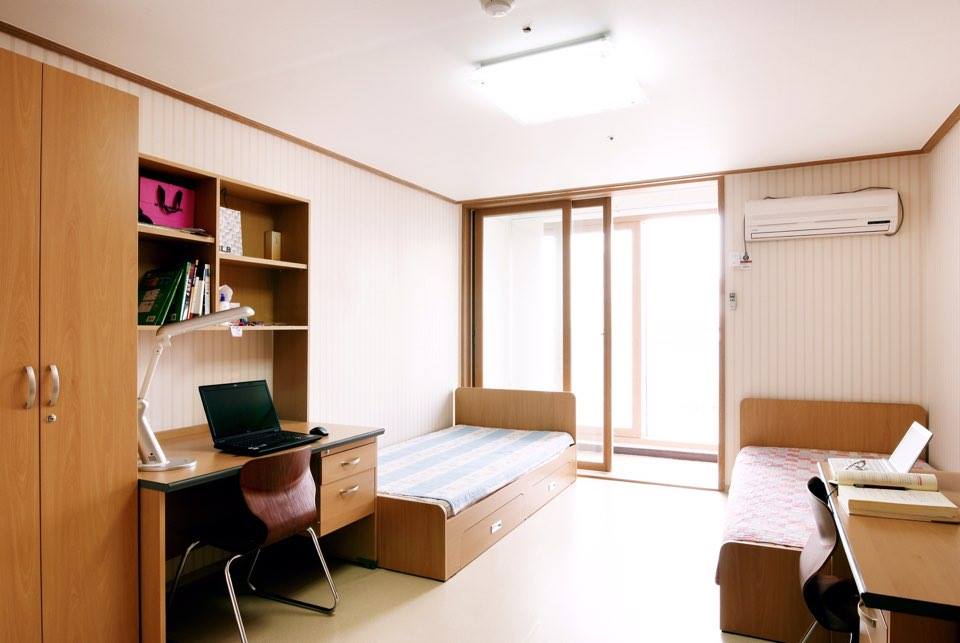
A dormitory room in the school
3. Types of outsourced houses
a) Hostel
An inn will provide you with room and food. Hostels are very popular among young people as it is a way to quickly adapt to the Korean lifestyle.
Rent: 200,000 KRW – 1,000,000 KRW/month (Different cities have different prices: in Seoul, 350,000 KRW – 550,000 KRW, in metropolitan cities like Daegu or Busan, 300,000 KRW – 500,000 KRW, and in other cities other rural areas are less expensive)
b) Goshiwon – Capsule room
A Goshiwon is a small room about three square meters in which international students will usually live for a short time to concentrate when there is a test or exam. These rooms usually have very limited space but are equipped with an air conditioner, desk, and bed.
Rent costs from 170,000 KRW - 450,000 KRW/month.
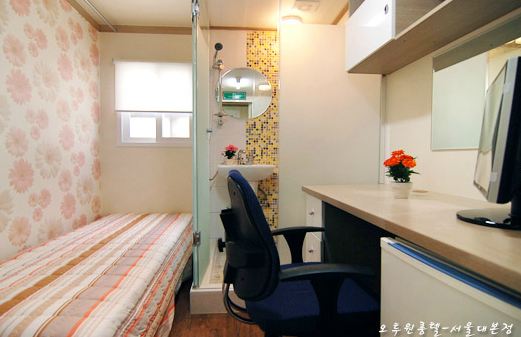
A Goshiwon Room
IV. National health insurance program
National Health Insurance Corporation (https://www.nhis.or.kr) provides health insurance for foreign students. The insurance is designed for overseas Koreans and foreigners in Korea for more than one year. Conditions to be insured are Foreign students, wife (or husband) and children (under 20 years old). There is also an English Inquiry Service Center for foreign students at 033-811-2000.
International Student Insurance
➼ If students want to buy insurance from a private company, they can buy health insurance and foreign body insurance from travel insurance companies. In the event of injury or illness, students may receive treatment in clinics or hospitals and pay at their own expense. They will then be compensated by the insurance company.
➼ Premium: Depending on the extent of injury or illness, insurance premiums will vary. On average, the cost of about 100,000 won for 1 year insurance is 1 million won.

➼ Benefits:
▪ Due to accident and illness: while traveling, if due to an unexpected accident, the insurance will not be responsible
▪ Medical Accident Reimbursement (Overseas): While traveling abroad, if the Insured Person is injured and has to undergo medical treatment by an overseas medical facility, the Company will actual medical expenses within the policy limit.
▪ Medical Accident Reimbursement (Domestic, Inpatient): While traveling, if the Insured Person is injured and is hospitalized in a domestic medical facility for treatment, the Company will pay pay medical expenses including hospitalization fees, disease prevention and expenses within the limit of the insured amount.
▪ Medical Accident Reimbursement (Domestic, Outpatient): While traveling, if the Insured Person undergoes outpatient treatment at a domestic medical facility due to injury, the Company will pay medical expenses less than the amount per treatment and within the limit of the insurance amount
※ deductible: 10,000 for clinics, 15,000 for hospitals and ₩20,000 for general specialty hospitals.
▪ Medical Accident Reimbursement (Domestic, on prescription): While traveling, if the Insured Person is injured and is determined to be able to receive outpatient treatment from a domestic medical facility, the Company The company will pay less per prescription and within the limits of the coverage amount.
※deductible: 8000
▪ Reimbursed medical insurance (domestic, by prescription): While traveling, if outpatient treatment is allowed by a medical facility in the past, the Company will pay less medical expenses. deductible amount per prescription and within the limit of the coverage amount.
➼ Reimbursement: In the event of illness or injury of the insured, the insurance company will only pay and process for the first time compensation is received from the company. Just send the receipt to the insurance company about the treatment and prescription
V. Means of transport
1. Bus
✵ City bus
Three types of buses connect the whole city: Ilban bus, Jwaseok bus, and Maeul bus. More than 400 expressway bus routes and 8,500 city buses serve Seoulites daily.
✵ Intercity bus
When planning to move to other cities across the country, the bus is one of the most convenient options. Buses are divided into highway buses and intercity buses. Highway buses will take you to other cities quickly by highway without any stops. There are four bus stops in Seoul: Dong Seoul, Sang Bong, Nambu, and Seoul Terminal.
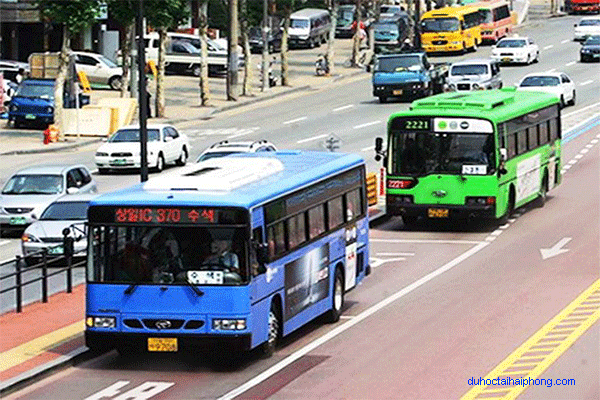
2. Subway
Cities and municipalities such as Seoul, Busan, Daegu, Gwangju, Daejeon all have subway systems. Most people use subway as their main transportation because the metro network is very well developed and very convenient and many lines. Seoul has 18 lines, but other metropolitan cities have only 1-3 lines less, but it is still very convenient compared to other transportation systems.
3. Taxi
Taxis in South Korea are affordable, comfortable, and also a convenient way to travel. In Seoul, taxis are divided into regular taxis and luxury taxis.
❃ Basic Type (Ilban) Taxi
You can tell the difference between a privately owned or a company taxi by the plastic light on the top of the cab. You will easily recognize which taxi company belongs to because there will be the company name and phone number on the door. The basic fare for taxis is 3,000 won for the first 2km in increments of 100 won for every 144m. Keep in mind that fares will increase by 20% between 12:00 - 4:00 am. Each area has different ticket prices.
❃ International Taxi
International Taxi provides the most convenient and comfortable services for both foreigners and visitors to Korea.
Types of International Taxis
① Universal taxi: 5 seats including driver, 1600cc-2000cc, orange color
② Luxury taxi: 5 seats including driver over 2000cc, black color
③ Large taxi: 6 ~ 9 seats including driver, over 3,000cc, black color
※ All drivers must wear a uniform and wear a name tag with a license present.
※ Details can be found at: www.intltaxi.co.kr (Korean / English / Japanese / Chinese), Tel: 1644-2255
(3) Mobeom Taxi
This is a luxury taxi, although it is more comfortable than many regular taxis, it is more expensive. The base fare is 5,000won for the first 3km with increments of 200won every 164m.
4. TrainsFour types of trains exist in Korea: KTX, Saemaeul, Mugunhwa, and Nuriro.
➥ Dormitory: The introduction of dormitory in 2004 has made life easier for Korean people for traveling to other cities. High-speed trains travel at 300 km/h. There are 20 trains with a total of 935 seats, 3 special compartments have 127 seats while 4 regular compartments have 808 seats. Standing compartments are also provided on the dormitories.
➥ Saemaul Train: is the next fastest way to travel, traveling from Seoul to Busan in 4.5 hours. The train is larger and there are no permanent room tickets available. The Saemaeul train stops in all major cities and was the fastest train before the advent of KTX. These trains are easily distinguished by blue, green, and yellow colors. The length of the train can vary from 5-12 cars.
➥ Mugunghwa train: named after Korea's national flower, with the slowest and most comfortable speed of the group. Standing room is always available and the seating is not as spacious as the Saemaeul train. The Mugunhwa train was commonly used before 2004 and is still widely used as the KTX or Saemaeul trains do not stop at many points.
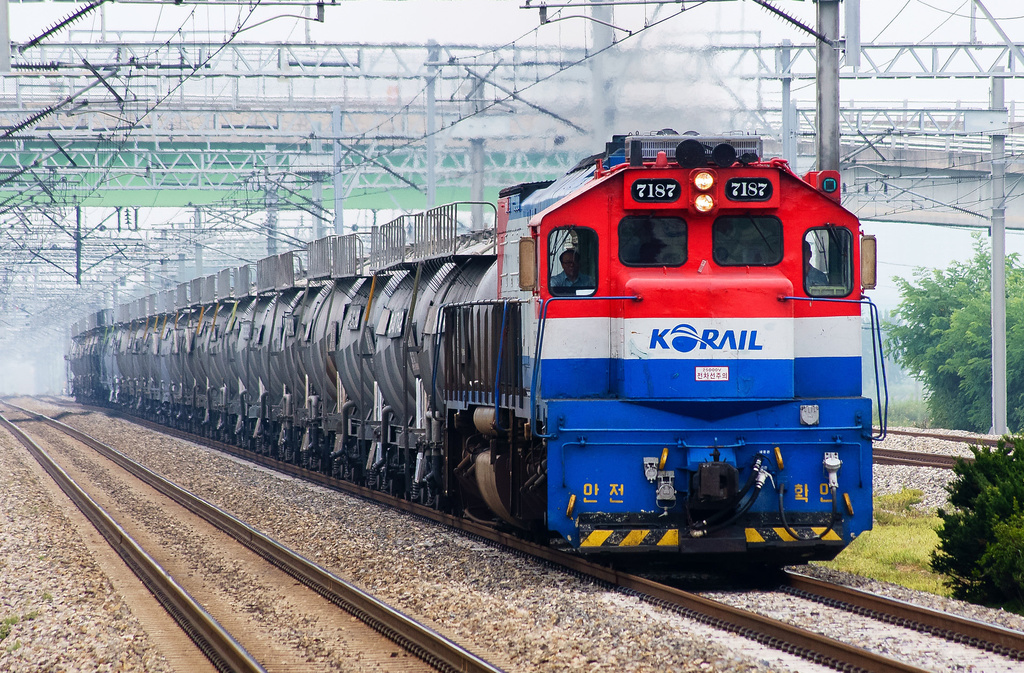
➥ Nuriro Train: The train is designed to be compatible with both flat terrain or highlands. To ensure a comfortable journey for all passengers, the Train has a disabled toilet, equipment to assist people with disabilities when boarding and disembarking, and luggage racks.
VI. Banks in Korea
1. Open an account
Foreigners can open a bank account by going to the bank where they reside. “Resident aliens” are individuals who have been in Korea for 6 months or more. “Non-resident foreigners” are individuals who have been in Korea for less than 6 months.
Documents needed to open an account: passport, alien registration card
2. Transfer money
When you want to send money abroad, you can use your bank's money order. Through a designated foreign exchange bank, you can transfer up to $50,000 a year (transfer fee + exchange rate), and if you have proof of the origin of that money, you are free to transfer amount within your income range. Different banks will have different fees and restrictions on money transfers.
Sending money by post will be more convenient and faster. For this type, you need to write the recipient's full name, address, account number, bank name, and other necessary information in English.
3. Foreign exchange
If you have a passport, you can easily exchange foreign currency or travelers' checks into Korean currency at Korean banks, including Korean Exchange Bank, and at airport exchange counters. You can redeem up to $10,000/1 transaction at a time. Exchange rates are not fixed and change depending on economic factors.
Links to websites of banks for reference:
KB Kookmin Bank: www.kbstar.com
KEB Hana Bank: www.hanabank.com
Woori Bank: www.wooribank.com
Shinhan Bank: www.shinhan.com

Kookmin Bank Vietnam
☞ SUPPORT FROM H&A
H&A understands the difficulties and problems of parents and students on the journey to study abroad.
H&A is ready to accompany you on your journey to study in Korea, please contact us for support and answer all your questions.
Free support services from H&A include:
✔Free Korean study abroad consultation, economical solution
✔Advice on choosing the right school, major and course
✔Support to apply for admission, monitor progress, receive confirmation letter from school
✔Advice on accommodation, study abroad budget, support to book flight tickets, equip skills before leaving



